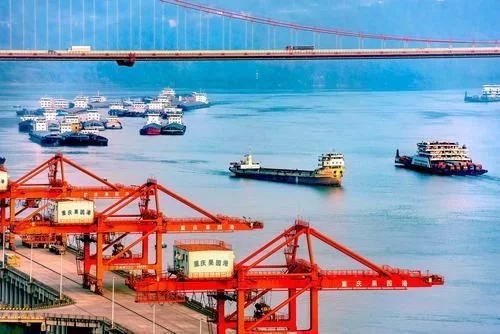The State owned Assets Supervision and Administration Commission of the State Council recently issued the "Notice on Regulating the Trade Management of Central Enterprises and Prohibiting All Types of False Trade" (hereinafter referred to as the "Notice"), which points out that the development of all types of false trade business is strictly prohibited, and there is "zero tolerance" for financing trade, "idle", and "order taking" false business problems. It also emphasizes the need to continue to deepen the accountability of central enterprises for illegal operation and investment. Industry insiders interviewed stated that in recent years, with the continuous increase of the State Council and local State owned Assets Supervision and Administration Commission in the construction and supervision of the internal control system of state-owned enterprises, and the deepening of various requirements, improving the construction and management level of the internal control system has become one of the core elements for measuring the comprehensive competitiveness of state-owned enterprises. The Notice also aims to enhance the supervision efficiency of state-owned assets by strengthening internal control.
The Notice proposes the "Ten Prohibitions" for trade business: firstly, it is prohibited to carry out trade business that deviates from the main business; Secondly, it is not allowed to participate in non commercial trade activities between enterprises with specific interests; Thirdly, it is not allowed to artificially add unnecessary transaction links in trade business; The fourth is to prohibit any form of financing trade; Fifth, it is not allowed to carry out trade activities such as idle transfer and transaction without control over the transaction subject matter; Sixth, it is prohibited to carry out circular trade without commercial substance; Seventh, it is not allowed to carry out abnormal trade business that goes against common sense of trading; Eighth, it is not allowed to carry out non-standard warehouse receipt transactions with higher risks; Ninth, it is not allowed to recognize agency trade income in violation of accounting standards; Ten is not allowed to conduct trade business in the absence of internal control mechanisms.
The reporter found that the documents issued by the State owned Assets Supervision and Administration Commission from 2019 to 2022 on the compliance requirements of central enterprises all reflect the process of the internal control system of central enterprises from "establishing rules" to "gradually improving". At the same time, various departments and localities have also issued a series of supporting documents, involving internal control supervision and evaluation, major business risk reports, state-owned asset supervision reminders and notifications, and many other aspects, promoting the continuous implementation and refinement of internal control work in central enterprises. In addition, the State owned Assets Supervision and Administration Commission has organized three random inspections and evaluations of the effectiveness of the internal control system of central enterprises. At the same time, in the relevant regulatory policies issued by the State owned Assets Supervision and Administration Commission, such as internal audit, compliance management, rule of law construction, benchmarking against world-class management, accelerating the construction of world-class financial management systems, and improving the quality of listed companies controlled by central enterprises, clear requirements have also been put forward for the internal control work of central enterprises.
In addition, in response to the industry's concerns about the definition standards for financing trade, the State owned Assets Supervision and Administration Commission (SASAC) has previously clearly stipulated that financing trade business is a non commercial and non compliant business that involves lending funds under the name of trade business. Its manifestations are diverse and have a certain degree of concealment, with the main characteristics of: firstly, fabricating trade backgrounds or artificially increasing transaction links; The second is that both upstream suppliers and downstream customers are controlled by the same actual controller, or there is a specific interest relationship between the upstream and downstream; The third is that the trade subject is substantially controlled by the other party; The fourth is to provide funds directly or indirectly through settlement bills, factoring, and credit support.
The interviewed lawyers pointed out that the specific requirements for the internal control system of central enterprise trade business are becoming increasingly clear, mainly including: clarifying the responsible persons and departments responsible for trade business in the group; Strictly control the number of trading subsidiaries, optimize and integrate the same or similar trading businesses, and the scope of trading business and the list of trading subsidiaries must be approved by the group; Central enterprises are not allowed to assess revenue scale indicators for their subsidiaries (excluding strategic emerging industries); Subsidiary enterprises engaged in trade business should formulate detailed rules for the implementation of internal control in trade business, establish specialized positions for trade internal control, strictly enforce business approval procedures, optimize fixed internal control processes, clarify internal control measures in key links, and strengthen internal control responsibilities; To develop and apply trade business risk management modules in information systems such as treasury, and use information technology to prevent and control various types of false trade business.
Industry insiders say that although the Notice is aimed at central enterprises, the previously released Guiding Opinions on Strengthening Debt Risk Control of Local State Owned Enterprises stipulate that, "Strictly control high-risk businesses such as low gross profit trade, financial derivatives, and PPP, strictly prohibit financing trade and false trade businesses such as' idle 'and' order taking ', and control major risk points in production and operation. Moreover, the" Notice "plays an important guiding role in identifying false trade, so local state-owned enterprises should also follow the" Notice "to strengthen the identification of false trade.". All state-owned enterprises involved in trade should promptly sort out all trade businesses in accordance with the guidance of the Notice, clean up and withdraw relevant trade businesses that are clearly prohibited in the Notice, standardize trade management according to requirements, improve internal control systems, formulate implementation rules for trade business internal control as soon as possible, establish specialized positions for trade internal control, strictly follow business approval procedures, optimize fixed internal control processes, clarify internal control measures in key links, and strengthen internal control responsibilities.











